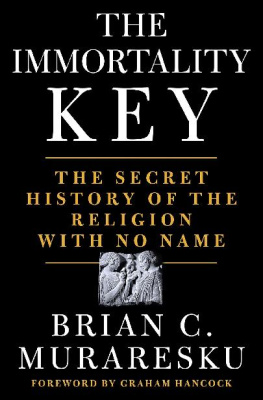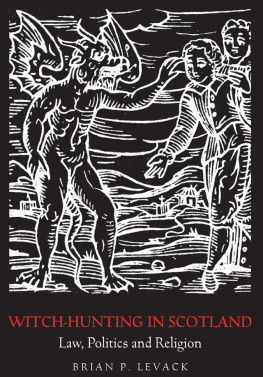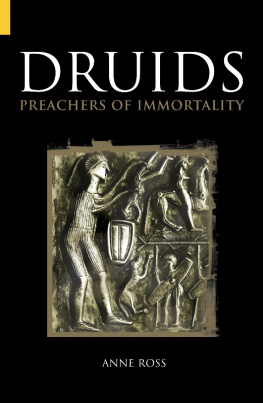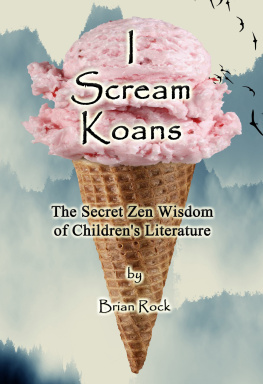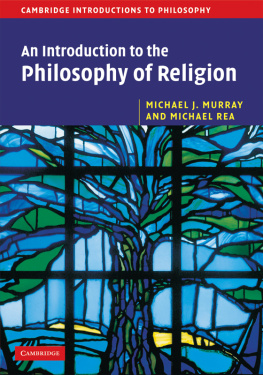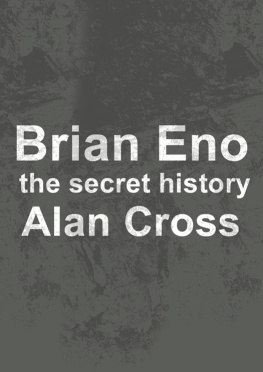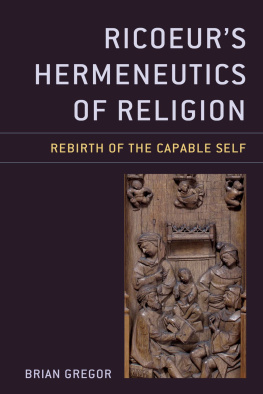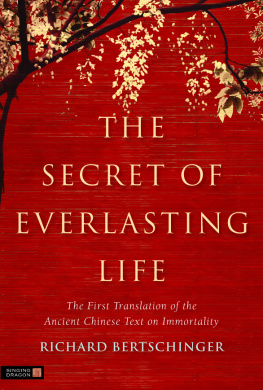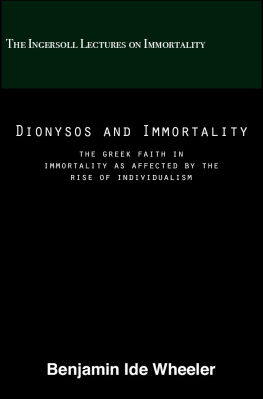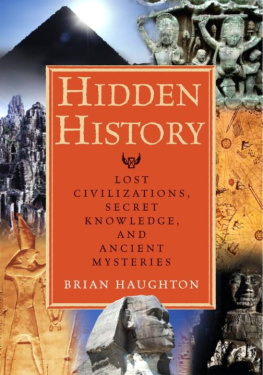Brian C. Muraresku - The Immortality Key: The Secret History of the Religion With No Name
Here you can read online Brian C. Muraresku - The Immortality Key: The Secret History of the Religion With No Name full text of the book (entire story) in english for free. Download pdf and epub, get meaning, cover and reviews about this ebook. year: 2020, publisher: St. Martins Publishing Group, genre: Religion. Description of the work, (preface) as well as reviews are available. Best literature library LitArk.com created for fans of good reading and offers a wide selection of genres:
Romance novel
Science fiction
Adventure
Detective
Science
History
Home and family
Prose
Art
Politics
Computer
Non-fiction
Religion
Business
Children
Humor
Choose a favorite category and find really read worthwhile books. Enjoy immersion in the world of imagination, feel the emotions of the characters or learn something new for yourself, make an fascinating discovery.
- Book:The Immortality Key: The Secret History of the Religion With No Name
- Author:
- Publisher:St. Martins Publishing Group
- Genre:
- Year:2020
- Rating:3 / 5
- Favourites:Add to favourites
- Your mark:
- 60
- 1
- 2
- 3
- 4
- 5
The Immortality Key: The Secret History of the Religion With No Name: summary, description and annotation
We offer to read an annotation, description, summary or preface (depends on what the author of the book "The Immortality Key: The Secret History of the Religion With No Name" wrote himself). If you haven't found the necessary information about the book — write in the comments, we will try to find it.
The Immortality Key: The Secret History of the Religion With No Name — read online for free the complete book (whole text) full work
Below is the text of the book, divided by pages. System saving the place of the last page read, allows you to conveniently read the book "The Immortality Key: The Secret History of the Religion With No Name" online for free, without having to search again every time where you left off. Put a bookmark, and you can go to the page where you finished reading at any time.
Font size:
Interval:
Bookmark:


Thank you for buying this
St. Martins Press ebook.
To receive special offers, bonus content,
and info on new releases and other great reads,
sign up for our newsletters.


Or visit us online at
us.macmillan.com/newslettersignup
For email updates on the author, click here.
The author and publisher have provided this ebook to you for your personal use only. You may not make this ebook publicly available in any way. Copyright infringement is against the law. If you believe the copy of this ebook you are reading infringes on the authors copyright, please notify the publisher at:
us.macmillanusa.com/piracy.
For Julieta Beln and Alexa Paz
without whom this book never would have been born
and because of whom it was almost never finished
And my PJ, the formosissima causa sine qua non
,
If you die before you die,
You wont die when you die.
Like Brian C. Muraresku, author of the excellent Immortality Key that it is my pleasure to introduce to you here, I was raised in a Christian household. My family was Presbyterian, whereas Brians upbringing was Roman Catholic. There are many doctrinal differences between these two denominations but both practice the rite of Holy Communion and until as late as the eighteenth century both advocated and pursued horrific deaths by burning at the stake for hereticsparticularly those accused of witchcraft.
My mother and father met in church in Edinburgh in the 1940s and my father went on to qualify as a surgeon, subsequently taking up a post as a medical missionary at the Christian Medical College in Vellore in the south of India, which he held from 1954 until 1958.
Born in 1950, I was my parents only child and our four years in the mission field, embedded in a devout Christian community, were undoubtedly formative in my lifealthough certainly not in the way that my father in particular had hoped. His efforts to fill my head with Christian ideas, buttressed by regular readings from the Old and New Testaments, only fueled my growing dislike of attending church and being forced to listen to long, boring sermons.
By the time I was fourteen that feeling of dislike had crystallized into detestation. The year was 1964; Id been back in Britain for six years and I was having a miserable time at a boarding school in the city of Durham. Affiliated to the Church of England (which has its own doctrinal differences from Catholicism and Presbyterianism, but with both of which it shares the rite of Holy Communion), that school, at that time, was horrible and sadistically violent in ways I wont even begin to describe here and was overlooked by a chilly stone chapel where regular services were heldservices that we, as pupils, were required to attend.
I remember actively dreading those services for being so remorselessly boring, and actively resenting them for their stupidity and irrationality. Why should I believe in this God and in his son Jesus, and why should I believe in Heaven and Hell, angels and Satan, just because the Bible, ministers of the church, and my parents told me that these things were real?
They werent real to me!
Expressing my rebellionin my teenage wayby refusing to kneel, pray, or sing hymns during chapel services, I determined that henceforth I would question everything and never again take anything on trust just because some authority figure, or some musty book, said it was so.
By my late teens I was already a committed atheistindeed atheism seemed to me to be the only reasonable and rational position to hold in response to Christian dogma. Then in the early 1970s I attended university where I studied sociology, at that time a radical and questioning discipline, and my views hardened further.
Ive stayed an atheist ever since, in the strict sense of the wordwhich derives from the Greek theos and means literally godless. Fifty years have gone by and I still see no reason to believe in a deity or deities of any kind. Nevertheless certain experiences that have come my way during this past half century have changed my outlook profoundly and, while god remains an unproven hypothesis, the experiences I speak of have persuaded me of the existence of realms and realities other than our own that coexist with ours, and exert influence upon every one of us, but that largely go unseen and unrecognized in modern technological societiesparticularly those that have suffered long exposure to Christian teachings.
If I listen to a sermon in church, the experience I have there (almost needless to say) is the experience of listening to a sermon in church, plus the experience of whatever reactions the sermon evokes in me.
The experience in this case, therefore, is akin to the experience of listening/reacting to a lecture or to any other kind of teaching. I may learn something new, or I may be confronted by material that I am already familiar with. And I may react with any of a broad range of emotions from crushing boredom at one end of the scale to enthusiastic engagement at the other, and with varying degrees of agreement or disagreement with what the speaker is saying.
Likewise if I listen to a lecture or read a book or academic paper on the human sex act, I may experience the lecture or book or paper as boring, or stimulating, or intriguing, or disconcerting, or informative, or redundant, etc. One thing is for sure, however: hearing the lecture or reading the book or paper is categorically not the same as the experience I would enjoy if I were actually having sex.
We can hopefully agree, therefore, thatas experiencesteachings, sermons, books, lectures, and papers are separate, distinctly different from, and of a lower order than, whatever it is they seek to describe, analyze, or elucidate. Just as to hear a lecture on sex is not the same as having sex, so to hear a sermon on the Kingdom of Heaven is not the same as visiting the Kingdom of Heaven and experiencing it directly.
Which brings me to the subject of psychedelics and the experiences they unleash.
My first encounter with psychedelics was in 1974 in England when I took LSD on impulse at a festival and was rewarded with twelve hours of bliss, revelation, scary challenges, time travel, and mystery. The experience was so powerful, however, that I felt afraid to seek it out againsuppose the second time went wrong to the same heightened level as the first time went right?and over the next thirty years I declined several opportunities for further trips.
Until, that is, I found myself writing a book that I originally intended to be about the mystery of Stone Age cave art but that ended up being about so much more than that. The book, published in 2005, was Supernatural: Meetings with the Ancient Teachers of Mankind, and in 2002 during the preliminary stages of research, I came across the work of David Lewis-Williams, professor of anthropology at the University of Witwatersrand in South Africa. Newly published that year, Davids book The Mind in the Cave: Consciousness and the Origins of Art came as a revelation to me. It presented reams of evidence supported by cogent arguments to make the case that the characteristic features of cave art all around the world, and the remarkable common themes in this art created by people who could have had no direct contact with one another, are best explained if the artists, wherever and whenever they lived, had all experienced deeply altered states of consciousnessspecifically those trance-like altered states sought out by shamans in tribal and hunter-gatherer cultures through the consumption of powerful psychedelic substances. In brief, Davids neuropsychological theory of cave art proposes that shamans of the Stone Age used a variety of meansnotably psychedelic plants and fungito enter trance states in which they experienced powerful visions. Later, returning to the normal, everyday state of consciousness, they remembered their visions and painted them on the walls of caves.
Font size:
Interval:
Bookmark:
Similar books «The Immortality Key: The Secret History of the Religion With No Name»
Look at similar books to The Immortality Key: The Secret History of the Religion With No Name. We have selected literature similar in name and meaning in the hope of providing readers with more options to find new, interesting, not yet read works.
Discussion, reviews of the book The Immortality Key: The Secret History of the Religion With No Name and just readers' own opinions. Leave your comments, write what you think about the work, its meaning or the main characters. Specify what exactly you liked and what you didn't like, and why you think so.

